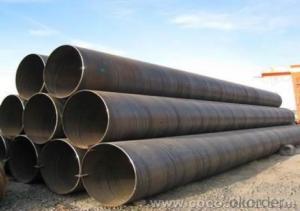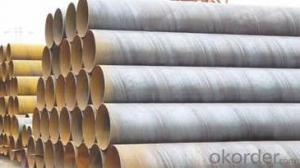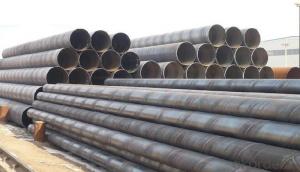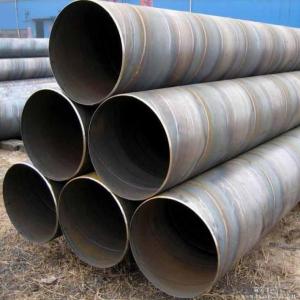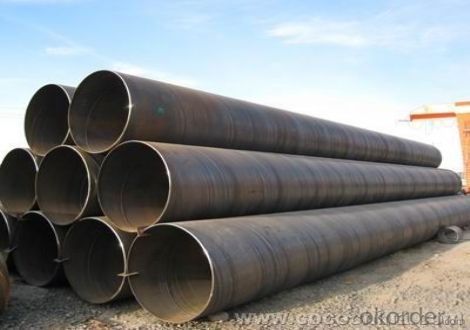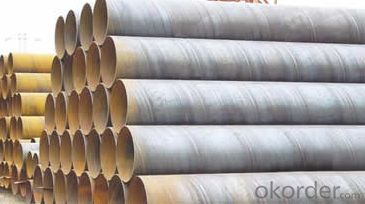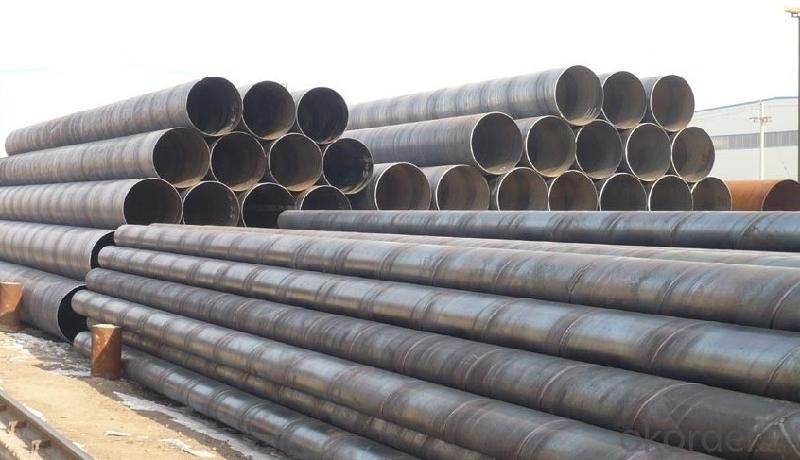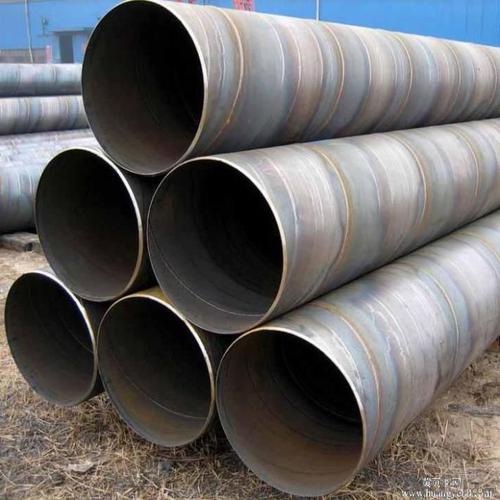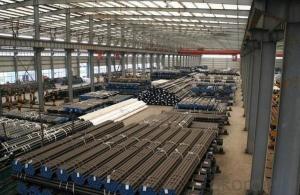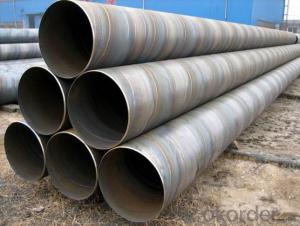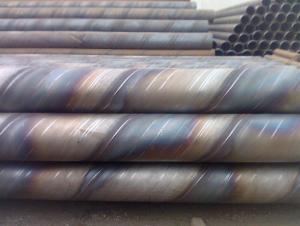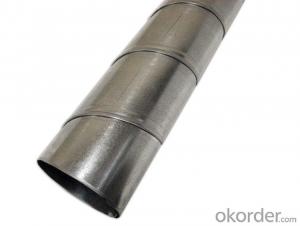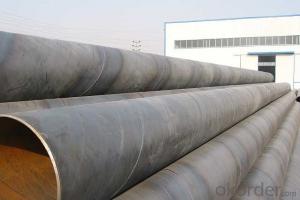SPIRAL STEEL PIPE 34’‘ ASTM API LARGE DIAMETER PIPE
- Loading Port:
- Tianjin
- Payment Terms:
- TT OR LC
- Min Order Qty:
- 5 m.t.
- Supply Capability:
- 3000 m.t./month
OKorder Service Pledge
OKorder Financial Service
You Might Also Like
Packaging & Delivery
Packaging Detail: | standard export packing or as customer's requirement |
Delivery Detail: | within 10 - 30 days |
Specifications
Spiral Welded Steel Pipes and Tubes
1.Material:Q195-Q235
2.Length:1-12m
3.WT:1.0-14mm
4.O.D.:20-273mm
Spiral Welded Steel Pipes and Tubes
Product Description:
1.Material : Q235,Q345,L245,L290,L360,L415,L450,L485,GrB,X42,46,X52,X56,X60,X65,X70,X80,X100
2,Standard: SY/T5037-2000,GB/T9711-2011,API Spec 5L PSL1/PSL2,ASTM A252\A53,ISO3183,DIN17172,EN10217,JIS G3457,AWWA C200,ASTM A139,ASTM A671,ASTM A672
3.Wall thickness: 3.0mm-30mm
4.Outer diameter: φ168mm-3020mm
5,Length: 5m-12m or as your requirement
6,Corrosion protection standard: DIN30670,DIN30671, AWWAC210, AWWA C203, SY/T0413-2002,SY/T0414-2002
7,Application: Oil, gas, natural gas, water pipe, thermal electricity pipe, steel structure engineering, etc
Q195-q345 Material Steel Pipe's Materials
Elements | Chemical Compsition% | Mechanical Property | ||||||
C% | Mn% | S% | P% | Si% | Yield Point (Mpa) | Tensile Strength(Mpa) | Elongation | |
Q195 | 0.06-0.12 | 0.25-0.50 | <0.050< span=""> | <0.045< span=""> | <0.030< span=""> | >195 | 315-430 | 32-33 |
Q215 | 0.09-0.15 | 0.25-0.55 | <0.05< span=""> | <0.045< span=""> | <0.030< span=""> | >215 | 335-450 | 26-31 |
Q235 | 0.12-0.20 | 0.30-0.70 | <0.045< span=""> | <0.045< span=""> | <0.030< span=""> | >235 | 375-500 | 24-26 |
Q345 | <0.20< span=""> | 1.0-1.6 | <0.040< span=""> | <0.040< span=""> | <0.55< span=""> | >345 | 470-630 | 21-22 |
- Q: Can steel pipes be used in plumbing systems?
- Yes, steel pipes can be used in plumbing systems. Steel pipes are commonly used for plumbing due to their durability, strength, and resistance to corrosion. They are suitable for both residential and commercial plumbing applications and can effectively transport water, gas, and other fluids.
- Q: How are steel pipes used in the construction of wastewater treatment plants?
- Steel pipes are commonly used in the construction of wastewater treatment plants due to their durability, strength, and corrosion resistance. These pipes are used to transport wastewater from different points within the treatment plant, such as pipes for raw sewage, sludge, and treated water. Additionally, steel pipes are also used for structural purposes, such as supporting tanks and other equipment. Overall, steel pipes play a crucial role in the efficient and reliable operation of wastewater treatment plants.
- Q: What are the different types of supports used for aboveground steel pipes?
- There are several types of supports commonly used for aboveground steel pipes, including pipe hangers, pipe clamps, pipe saddles, and pipe shoes. These supports are designed to provide stability and prevent excessive movement or vibration of the pipes, ensuring their proper alignment and preventing damage.
- Q: How are steel pipes used in the manufacturing of shipbuilding and offshore structures?
- Steel pipes are a necessity when it comes to manufacturing shipbuilding and offshore structures. Their strength, durability, and resistance to corrosion make them the perfect choice for the challenging marine environment. When it comes to shipbuilding, steel pipes serve various purposes. They are primarily used in constructing the hull, which provides structural support to the ship. Steel pipes are responsible for forming the keel and frames, ensuring the hull's shape and strength. By welding these pipes together, a strong and rigid structure is created, capable of withstanding the forces experienced during navigation. Additionally, steel pipes find use in constructing different systems aboard the ship. They are essential components of the piping system, responsible for transporting fluids like fuel, water, and oil throughout the vessel. Furthermore, steel pipes contribute to the ventilation and air conditioning systems, guaranteeing proper airflow and temperature control within the ship. In offshore structures, such as oil rigs and platforms, steel pipes play a vital role. These structures endure extreme environmental conditions, including severe weather, high pressure, and corrosive saltwater. Steel pipes are instrumental in fabricating load-bearing components like legs and risers. Their strength and stability allow the structure to withstand the forces of waves, wind, and drilling operations. Moreover, steel pipes are crucial in constructing subsea pipelines. These pipelines facilitate the transportation of oil, gas, and other fluids from offshore drilling sites to onshore facilities. Steel pipes are preferred due to their high tensile strength and ability to withstand the high pressure and corrosive conditions found in subsea environments. Overall, steel pipes are indispensable in the manufacturing of shipbuilding and offshore structures. Their exceptional strength, durability, and corrosion resistance make them the preferred choice for constructing hulls, systems, and load-bearing components. Without steel pipes, the construction of ships and offshore structures would compromise safety, reliability, and longevity.
- Q: Is the PVC tube a plastic tube or a plastic tube?.
- It's plastic tubePolyvinyl chloride (Poly, Vinyl, Chloride, PVC)PVC is a VCM monomer (vinyl, chloride, monomer), in peroxide, azo compounds and other initiators;
- Q: What are the different methods of pipe inspection for steel pipes?
- There are several methods of pipe inspection that can be used for steel pipes. Some of the commonly used methods are as follows: 1. Visual Inspection: This is the most basic form of pipe inspection where a trained inspector visually examines the exterior and interior of the pipe to identify any visible defects or abnormalities. This method is often used as a preliminary inspection before more advanced techniques are employed. 2. Magnetic Particle Inspection (MPI): MPI involves applying a magnetic field to the steel pipe and then applying iron particles to the surface. Any surface cracks or defects in the pipe will cause a leakage of magnetic flux, which can be detected by the inspector. This method is particularly effective in identifying surface defects in ferromagnetic materials. 3. Ultrasonic Testing (UT): UT is a non-destructive testing method that uses high-frequency sound waves to detect internal defects or anomalies in steel pipes. A transducer is used to send ultrasonic waves into the pipe, and the reflections or echoes of the sound waves are analyzed to determine the presence of defects such as corrosion, cracks, or wall thickness variations. 4. Radiographic Testing (RT): In this method, X-rays or gamma rays are used to create an image of the internal structure of the steel pipe. The X-rays or gamma rays pass through the pipe, and the resulting image can reveal any defects, such as cracks, corrosion, or weld discontinuities. This method is commonly used for inspecting welded joints. 5. Eddy Current Testing (ECT): ECT is a non-destructive testing technique that uses electromagnetic induction to detect surface and near-surface defects in steel pipes. A coil carrying an alternating current is passed over the pipe's surface, and any changes in the electrical conductivity or magnetic field caused by defects are detected and analyzed. 6. Acoustic Emission Testing (AET): AET is a method that detects and analyzes the high-frequency acoustic signals emitted by materials when they undergo deformation or damage. In the case of steel pipes, AET can be used to monitor and identify defects such as cracks, leaks, or corrosion by analyzing the acoustic signals emitted during service or under stress. These are just a few of the commonly used methods of pipe inspection for steel pipes. The choice of method depends on various factors such as the type of defect being looked for, the accessibility of the pipe, the desired level of sensitivity, and the cost and time constraints. It is often recommended to use a combination of inspection techniques to ensure a thorough assessment of the steel pipes.
- Q: Can steel pipes be used for scaffolding?
- Yes, steel pipes can be used for scaffolding. They are commonly used in construction projects as they provide strength, durability, and stability required for supporting workers and materials at elevated heights. Steel pipes are known for their load-bearing capacity and can be easily assembled and disassembled, making them a suitable choice for scaffolding systems.
- Q: How are steel pipes used in the transportation industry?
- Steel pipes are used in the transportation industry for various purposes, including the construction of pipelines for transporting oil, gas, and other fluids. They are also used in the manufacturing of vehicles, such as cars, trucks, and trains, where they are commonly used for exhaust systems and structural components. Additionally, steel pipes are utilized in the construction of bridges, tunnels, and other infrastructure projects that support transportation networks.
- Q: How do steel pipes handle high-velocity flow?
- Steel pipes are able to handle high-velocity flow due to their strong and durable nature. The smooth inner surface of steel pipes allows for efficient and smooth flow of fluids, minimizing frictional losses. Additionally, steel pipes have high tensile strength, enabling them to withstand the pressure exerted by high-velocity flow without deformation or bursting.
- Q: What's the use of steel pipe?
- No other type of steel can replace the steel tube entirely, but the steel tube can take the place of some sections and bars. Steel pipe is very important to the development of national economy and the improvement of human life quality, much better than other steel products. From the people's daily utensils, furniture, water supply and drainage, gas supply, ventilation and heating facilities to all kinds of agricultural machinery equipment manufacturing, underground resources development, national defense and space use guns, bullets, missiles, rockets and so cannot do without steel.
Send your message to us
SPIRAL STEEL PIPE 34’‘ ASTM API LARGE DIAMETER PIPE
- Loading Port:
- Tianjin
- Payment Terms:
- TT OR LC
- Min Order Qty:
- 5 m.t.
- Supply Capability:
- 3000 m.t./month
OKorder Service Pledge
OKorder Financial Service
Similar products
Hot products
Hot Searches
Related keywords
